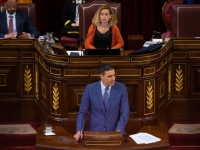Politics
Algeria breaks relations with Spain
For the Spanish position on the Sahara
USPA NEWS -
The Government of Algeria announced this Wednesday that it is suspending the Treaty of Friendship and Good Neighborhood that it had maintained with Spain for 20 years, due to the Spanish position on Western Sahara. Weeks after the Spanish Government announced its recognition of Moroccan sovereignty over the former Spanish colony and coinciding with the appearance in Parliament of the Spanish Prime Minister, Pedro Sánchez, to discuss the change in official position on Western Sahara, the Government of Algeria issued a statement announcing the breakdown of relations.
Algeria announced the "immediate" suspension of the Treaty of Friendship, Good Neighborhood and Cooperation with Spain, due to the "unjustifiable" position of the Spanish Government on Western Sahara. "The Spanish authorities have launched a campaign to justify the position they have adopted on Western Sahara, a violation of their legal, moral and political obligations as the administrative power of the territory that weigh on the Kingdom of Spain," the Algerian Government points out in the release.
The Algerian Government defends the independence of Western Sahara and the sovereignty of the Polisario Front over the former Spanish colony. A position also defended by Spain until, weeks ago, the Spanish Government announced the change in its position. A change that also contradicts United Nations resolutions, since it recognizes Western Sahara as part of Moroccan territory. For the opposition in the Spanish Parliament, the change in the Government's position may be related to the controversy over the use of the Israeli program Pegasus to spy on members of the Government of Prime Minister Pedro Sánchez. Although Police sources consider it very unlikely that it will be known who was behind the espionage, the opposition considers that it may be Morocco and that the change of position on Western Sahara seeks to satisfy the Rabat Government.
Despite the suspension of the Treaty with Algeria, the Spanish Government assured this Wednesday that it was not worried. The Minister of Foreign Affairs, José Manuel Albares, assured journalists in statements that Spain has received "guarantees at the highest level" that this crisis will not affect the supply of Algerian gas that Spain receives. Algeria is the main supplier of gas to Spain, more important after the closure of the pipelines that supply Europe from Russia.
Strengthen cooperation with Morocco
The Algerian statement was released the same day that the Spanish Prime Minister, Pedro Sánchez, appeared in Parliament to speak, among other things, about the new stage in relations between Spain and Morocco. Regarding Western Sahara, Sánchez affirmed that the Moroccan proposal for autonomy is "the most serious, credible and realistic basis" to resolve "a conflict that has lasted too long" and that Spain has not disregarded the cause of the Saharawi people. The solution, he insisted, will have to be accepted by both parties and meet the conditions set forth in the United Nations Charter and its resolutions. The active search for the agreement corresponds to the personal envoy of the Secretary General of the United Nations, to whom the President of the Spanish Government reiterated "his full support for him."Regarding the new relations with Morocco, Sánchez affirmed that it is convenient for both countries, especially families and companies on both sides of the border, and that the Joint Declaration "builds a system of guarantees" that includes, first of all, integrity territorial. "The Spanish sovereignty over Ceuta and Melilla is beyond any doubt, as in any other part of the national territory," he assured. The normalization of relations, he added, means reestablishing all maritime connections, the gradual opening of border crossings and the preparation of Operation Crossing the Strait, which regulates the passage through Spain of thousands of Moroccans who, from Europe, travel to their country for the holidays. Spain and Morocco have undertaken to ensure the necessary customs instruments to regulate the normal traffic of people and goods.
The Joint Declaration also implies "relaunching and reinforcing" cooperation on migration, explained Sánchez. "Spain is not going to tolerate the exploitation of the tragedy of irregular emigration as a weapon of pressure. And, in the face of this, the best instrument is international cooperation for an orderly management of migratory flows," he warned. This cooperation, he added, must extend to the bilateral economic agenda, infrastructure and specific areas such as education, culture, sports or scientific research. Sánchez advanced that the working group for the delimitation of maritime spaces on the Atlantic coast, which has not met for fifteen years, is going to be reactivated. The Canary Islands will be fully associated with this work and their interests will continue to be taken into account as a priority, according to him.
Liability for this article lies with the author, who also holds the copyright. Editorial content from USPA may be quoted on other websites as long as the quote comprises no more than 5% of the entire text, is marked as such and the source is named (via hyperlink).







